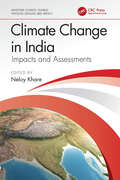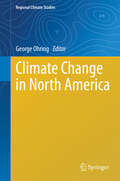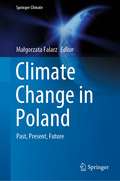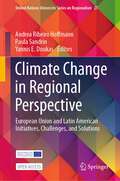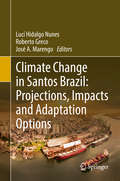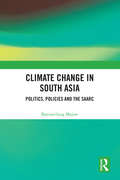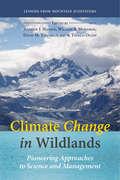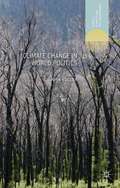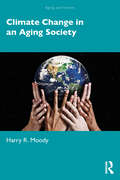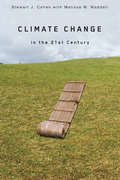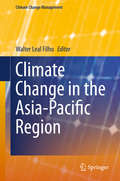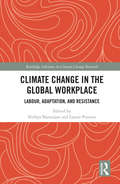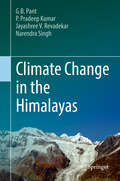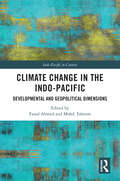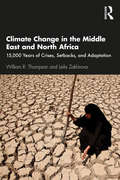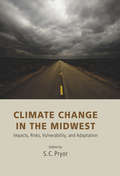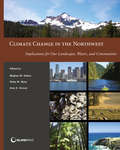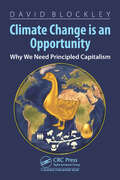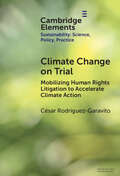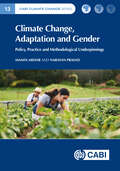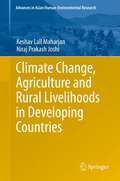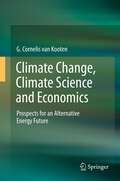- Table View
- List View
Climate Change in India: Impacts and Assessments (Maritime Climate Change)
by Neloy KhareThe climate over the Indian subcontinent is influenced by complex interactions between the atmosphere, ocean, and land, along with human interventions that are influencing heat extremes, changing monsoon patterns, sea-level rise, and posing serious threats to lives and livelihoods among populations in India. This book, based on recent studies and research, explains how and why the climate is changing across India and how these changes are expected to evolve in the future. It takes a holistic view of the climate from India’s perspective and discusses important themes such as groundwater, land use, livestock, and natural disasters. Readers will have an in-depth understanding of impacts and possible adaptations.Features Includes case studies of groundwater and the effect of climate change. Identifies land use and land cover changes in different regions in India. Discusses the implications of past and present climate change on various livestock types. Explains various natural hazards and their relationship to climate change. Describes technological intervention in climate change. Researchers, academics, and graduate students in Earth sciences, climatology, meteorology, or environmental studies working on projects related to climate change will find this an invaluable reference. Governmental organizations, institutions, and global NGOs will also benefit from the insights presented in this book.
Climate Change in North America (Regional Climate Studies)
by George OhringThis book describes thoroughly the North American Climate of the past 65 million years, with special emphasis on the last 21,000 years, as revealed by paleoclimatic observations and climate models. It analyzes weather observations over the past century and satellite measurements of the last few decades to develop a picture of more recent climatic trends. It explains how global climate models are used to simulate and project climate, and presents the application of these models to reproduce recent climate variations and predict future North American climate. It answers the critical question of whether observed climate change is due to natural variations or human activity.
Climate Change in Poland: Past, Present, Future (Springer Climate)
by Małgorzata FalarzThis edited book provides a comprehensive overview of the past, present and future climate development in Poland. The book consists of three main parts. The first part presents the results of the study of climate change before instrumental measurements in Poland in the last millennium. The second part analyses the long-term changes and variability of 36 climate characteristics for 14 climate elements, indices, meteorological phenomena and weather types using data from 79 weather stations in the base period 1951–2018 and for long series up to 239 years (1780–2018). The particular attention is paid to climate extremes. The third part of the book deals with projected changes in temperature, precipitation and thermal indices related to the agriculture and energy sectors. Two future time horizons are carried out: 1) near future: 2021–2050 and 2) far future: 2071–2100. The results for Poland are compared to those from Europe and other parts of the world.The book is addressed to scientists (climatologists, geographers, etc.), academic teachers, students, journalists and all those interested in Poland and climate change in Poland.
Climate Change in Regional Perspective: European Union and Latin American Initiatives, Challenges, and Solutions (United Nations University Series on Regionalism #27)
by Andrea Ribeiro Hoffmann Paula Sandrin Yannis E. DoukasThis Open Access book addresses climate change in Europe and Latin America from a comparative regionalism studies (CRS) perspective. Written by an international team of scholars and experts, chapters critically analyze proposals for mitigating climate change while contributing to the mutual understanding about the issues at stake across regions. The book is divided into three main sections. In the first section, authors discuss EU and Latin American cooperation, negotiations, and perspectives on climate change, exploring their agendas, the interests and key challenges at the global, regional and interregional levels. The second section focuses on the challenges to finance development and a greener economy. The third section explores new green solutions to climate change in the agriculture sector and initiatives such as nature-based solutions to climate change and best practices. Providing policy oriented solutions for combatting regional climate change at a critical juncture, this volume will be of interest to researchers and students of international relations, international law, and environmental politics, as well as public officials and climate change activists.
Climate Change in Santos Brazil: Projections, Impacts and Adaptation Options
by Lucí Hidalgo Nunes Roberto Greco José A. MarengoThis book is the result of the project METROPOLE: An Integrated Framework to Analyse Local Decision Making and Adaptive Capacity to Large-Scale Environmental Change: Community Case Studies in Brazil, UK and the US, supported by the Belmont Forum-G8 Initiative Collaborative Research (Coastal Vulnerability, G8MUREFU3 2201-040). The Project METROPOLE was designed to address some important challenges of our time: on one hand, how to reduce the risks from climate change in coastal areas, in view of safeguarding life, assuring the safety of assets and the maintenance of rich ecosystems; and on the other hand, how to improve the interaction between scientists, decision makers and population for a common goal, to prevent alarming projections of sea level rise from being realized. This book focuses on the basis of the project which is anchored in the recognition of the importance of both dialogue and action on climate change involving different actors. Therefore, the participation of decision-makers, the population and representatives of civil and private organizations are key-elements in ensuring measures that might slow down, minimise or even restrict the perverse effects of climate change.
Climate Change in South Asia: Politics, Policies and the SAARC
by Baniateilang MajawThis volume studies the challenges of climate change in South Asia and examines the role of the South Asian Association for Regional Cooperation (SAARC) in addressing them. It highlights the dangers posed by climate change in South Asia and underlines the need to strengthen and intensify regional cooperation to preserve, protect and manage the diverse and fragile eco-systems of the region. The book examines policies and initiatives of the SAARC in tackling these issues and also analyzes their implementation by member countries. Comprehensive and topical, this volume will be useful for scholars and researchers of South Asian Studies, environmental studies, climate change studies, public policy and governance, development studies, international relations, regional cooperation, and political studies. It will also be of importance to policymakers and NGOs working in this field.
Climate Change in Wildlands: Pioneering Approaches to Science and Management
by Andrew J. Hansen William B. Monahan S. Thomas Olliff David M. TheobaldScientists have been warning for years that human activity is heating up the planet and climate change is under way. In the past century, global temperatures have risen an average of 1. 3 degrees Fahrenheit, a trend that is expected to only accelerate. But public sentiment has taken a long time to catch up, and we are only just beginning to acknowledge the serious effects this will have on all life on Earth. The federal government is crafting broad-scale strategies to protect wildland ecosystems from the worst effects of climate change. The challenge now is to get the latest science into the hands of resource managers entrusted with protecting water, plants, fish and wildlife, tribal lands, and cultural heritage sites in wildlands. Teaming with NASA and the Department of the Interior, ecologist Andrew Hansen, along with his team of scientists and managers, set out to understand how climate and land use changes affect montane landscapes of the Rockies and the Appalachians, and how these findings can be applied to wildlands elsewhere. They examine changes over the past century as well as expected future change, assess the vulnerability of species and ecosystems to these changes, and provide new, collaborative management approaches to mitigate expected impacts. A series of case studies showcases how managers might tackle such wide-ranging problems as the effects of warming streams on cold-water fish in Great Smoky Mountain National Park and dying white-bark pine stands in the Greater Yellowstone area. A surprising finding is that species and ecosystems vary dramatically in vulnerability to climate change. While many will suffer severe effects, others may actually benefit from projected changes. Climate Change in Wildlands is a collaboration between scientists and managers, providing a science-derived framework and common-sense approaches for keeping parks and protected areas healthy on a rapidly changing planet.
Climate Change in World Politics (Energy, Climate and the Environment)
by John VoglerJohn Vogler examines the international politics of climate change, with a focus on the United Nations Framework Convention (UNFCCC). He considers how the international system treats the problem of climate change, analysing the ways in which this has been defined by the international community and the interests and alignments of state governments.
Climate Change in an Aging Society (Aging and Society)
by Harry R. MoodyClimate Change in an Aging Society is the first book fully devoted to the impact of climate change on those who are old today—and those who will be old in decades to come. In doing so, Moody focuses on issues of critical importance: aging in place; health and age in a warming world; responsibility for the climate crisis; options for climate-conscious consumers; planning for investment for a green retirement; and opportunities for political action.The number of Americans aged over 65 is projected to rise from 17% to 21%. By 2060 nearly one in four Americans will be 65 or older. By 2050, however, average temperatures in the USA could rise by as much as 3°C, and extreme weather events are likely to become more frequent and severe. Despite these alarming projections and the likelihood that climate change will cause serious health issues among the elderly, little attention has been devoted to the impact of climate change on this demographic. Employing a life-course perspective and a cross-generational approach, Moody assesses the impact of climate change on those who are old today and those who will be old in years to come. Challenging both climate complacency and climate defeatism, the book adopts as its clarion call, HERE NOW YOU HOPE.Written in an engaging personal style with highlighting case studies of influential "eco-elders," this urgent book will be of great interest to students and scholars with interests in climate change, gerontology, and environmental and social policy.
Climate Change in the 21st Century
by Stewart J. Cohen Melissa W. WaddellPublic and media interest in the climate change issue has increased exponentially in recent years. Climate change, or "global warming," is a complex problem with far-reaching social and economic impacts. Climate Change in the 21st Century brings together all the major aspects of global warming to give a state of the art description of our collective understanding of this phenomenon and what can be done to counteract it on both the local and global scale. Stewart Cohen and Melissa Waddell explain and clarify the different ways of approaching the study of climate change and the fundamental ideas behind them. From a history of climate change research to current attempts to mitigate its impact such as the Kyoto Protocol and carbon trading, they explore key ideas from many fields of study, outlining the environmental and human dimensions of global warming. Climate Change in the 21st Century goes beyond climate modeling to investigate interdisciplinary attempts to measure and forecast the complex impacts of future climate change on communities, how we assess their vulnerability, and how we plan to adapt our society. The book explores the impact of climate change on different ecosystems as well as what the social and economic understanding of this phenomenon can tell us; it also links discussions of climate change with the global discourse of sustainable development. Climate Change in the 21st Century provides a comprehensive, understandable, but academically informed introduction to the world's biggest challenge for both students and concerned citizens.
Climate Change in the 21st Century
by Stewart J. Cohen Melissa W. WaddellPublic and media interest in the climate change issue has increased exponentially in recent years. Climate change, or "global warming," is a complex problem with far-reaching social and economic impacts. Climate Change in the 21st Century brings together all the major aspects of global warming to give a state of the art description of our collective understanding of this phenomenon and what can be done to counteract it on both the local and global scale. Stewart Cohen and Melissa Waddell explain and clarify the different ways of approaching the study of climate change and the fundamental ideas behind them. From a history of climate change research to current attempts to mitigate its impact such as the Kyoto Protocol and carbon trading, they explore key ideas from many fields of study, outlining the environmental and human dimensions of global warming. Climate Change in the 21st Century goes beyond climate modeling to investigate interdisciplinary attempts to measure and forecast the complex impacts of future climate change on communities, how we assess their vulnerability, and how we plan to adapt our society. The book explores the impact of climate change on different ecosystems as well as what the social and economic understanding of this phenomenon can tell us; it also links discussions of climate change with the global discourse of sustainable development. Climate Change in the 21st Century provides a comprehensive, understandable, but academically informed introduction to the world's biggest challenge for both students and concerned citizens.
Climate Change in the Asia-Pacific Region (Climate Change Management)
by Walter Leal FilhoThis book investigates the socio-economic impacts of Climate Change in the Asia-Pacific region. The authors put forward a strategy and action plans that can enhance the capacity of government agencies and non-governmental organizations to reduce the negative impacts of climate change. The needs and interests of critical and neglected groups are highlighted throughout the book, alongside the need for improving knowledge management on climate change. The case studies presented offer regional analyses for countries such as Australia, Bangladesh, China, Fiji, India, Mongolia, Nepal and the Philippines and cover issues such as livelihood vulnerability and displacement, climate migration, macroeconomic impacts, urban environmental governance and disaster management.
Climate Change in the Global Workplace: Labour, Adaptation and Resistance (Routledge Advances in Climate Change Research)
by Nithya Natarajan; Laurie ParsonsThis book offers a timely exploration of how climate change manifests in the global workplace. It draws together accounts of workers, their work, and the politics of resistance in order to enable us to better understand how the impacts of climate change are structured by the economic and social processes of labour. Focusing on nine empirically grounded cases of labour under climate change, this volume links the tools and methods of critical labour studies to key debates over climate change adaptation and mitigation in order to highlight the active nature of struggles in the climate-impacted workplace. Spanning cases including commercial agriculture in Turkey, labour unions in the UK, and brick kilns in Cambodia, this collection offers a novel lens on the changing climate, showing how both the impacts of climate change and adaptations to it emerge through the prism of working lives. Drawing together scholars from anthropology, political economy, geography, and development studies, this book will be of great interest to students and scholars of climate change adaptation, labour studies, and environmental justice. More generally, it will be of interest to anybody seeking to understand how the changing climate is changing the terms, conditions, and politics of the global workplace.
Climate Change in the Himalayas
by G. B. Pant P. Pradeep Kumar Jayashree V. Revadekar Narendra SinghThis book analyzes the issues associated with climate change in the Himalayas. The purpose of choosing the Himalayas as a focus is because it is a particularly fragile mountain system, highly sensitive to climate change impacts, and it contains one of the largest human populations affected by climate change. The book provides extensive data and information regarding the climate history of the Himalayas, and the current effects of climate change on Himalayan weather systems, and on human and animal populations in the region. The book begins with an overview of global climate change with discussions of data trends and international initiatives, then segues into a history of climate changes and weather trends in the Himalayas. Weather systems of the Himalayas, both past and current, are analyzed and detailed through climate models, seasonal observations of weather fronts, and overviews of various climate scenarios. The book then discusses climate change impacts and signat ures specific to the Central Himalayan region, where the largest effects of impacts are observed. Readers will discover analysis presented on water resources, meteorological changes, biodiversity, agriculture and human health along with perspectives of management and policy. This book will appeal to researchers studying climate science, climatology, environmental scientists and policymakers.
Climate Change in the Indo-Pacific: Developmental and Geopolitical Dimensions (Indo-Pacific in Context)
by Faisal Ahmed and Mohd. FaheemThis book explores multifarious policy dimensions relevant to climate change and its associated vulnerabilities in the Indo-Pacific region.The essays in the volume focus on:• Climate resilience in terms of policy implementation at the local, national, and regional levels in Asia-Pacific;• Understanding climate change through the lens of non-traditional security;• Assesses geo-economic and geopolitical impacts and adaptation strategies;• Examines issues of climate refugees and migration.The volume will be of great interest to scholars and researchers of politics, public policy, environment and sustainability studies, climate action and Indo-Pacific studies.
Climate Change in the Middle East and North Africa: 15,000 Years of Crises, Setbacks, and Adaptation
by William R. Thompson Leila ZakhirovaEnvironmental factors in the Middle East and North Africa (MENA) have played a crucial role in the historical and social development of the region. The book delves into a broad set of historical literature from the past 15,000 years that neglected to consider environmental factors to their full effect. Beyond the broad historic analysis, the chapters derive conclusions for today’s debate on whether climate change leads to more social conflict and violence. Introducing a theoretical framework focused on adaptive cycling, this book probes and refines the role of climate in ancient and modern political-economic systems in the MENA region. It also underscores just how bad the 21st-century environment may become thanks to global warming. While the MENA region may not survive the latest onslaught of deteriorating climate, there is also some interest in how a region that once led the world in introducing all sorts of innovations thousands of years ago has evolved into a contemporary setting characterized by traditional conservatism, poverty, and incessant strife. Emphasizing regional dynamics, the book's central question deals with the role of climate change in the rise and decline of the MENA region. The book will be a key resource to students and readers interested in global warming, including academics and policymakers.
Climate Change in the Midwest
by Sara C. PryorThe research presented in this volume focuses on identifying and quantifying the major vulnerabilities to climate change in the Midwestern United States. By providing state-of-the-art spatially disaggregated information regarding the historical, current, and possible future climate within the region, the contributors assess the risks and susceptibility of the critical socio-economic and environmental systems. Key sectors discussed are agriculture, human health, water, energy and infrastructure, and the vulnerabilities that may be amplified under current climate trajectories. The book also considers the challenges and opportunities to develop local and regional strategies for addressing the risks posed by climate change in the context of developing an integrative policy for the region.
Climate Change in the Northwest: Implications for Our Landscapes, Waters, and Communities (NCA Regional Input Reports)
by Meghan M. Dalton Philip W. Mote Amy K. SnoverClimate Change in the Northwest: Implications for Our Landscapes, Waters, and Communities is aimed at assessing the state of knowledge about key climate impacts and consequences to various sectors and communities in the northwest United States. It draws on a wealth of peer-reviewed literature, earlier state-level assessment reports conducted for Washington (2009) and Oregon (2010), as well as a risk-framing workshop. As an assessment, it aims to be representative (though not exhaustive) of the key climate change issues as reflected in the growing body of Northwest climate change science, impacts, and adaptation literature now available. This report will serve as an updated resource for scientists, stakeholders, decision makers, students, and community members interested in understanding and preparing for climate change impacts on Oregon, Washington, and Idaho. This more detailed, foundational report is intended to support the key findings presented in the Northwest chapter of the Third National Climate Assessment.
Climate Change in the Polar Regions
by John Turner Gareth J. MarshallThe polar regions have experienced some remarkable environmental changes in recent decades, such as the Antarctic ozone hole, the loss of large amounts of sea ice from the Arctic Ocean and major warming on the Antarctic Peninsula. The polar regions are also predicted to warm more than any other region on Earth over the next century if greenhouse gas concentrations continue to rise. Yet trying to separate natural climate variability from anthropogenic factors still presents many problems. This book presents a thorough review of how the polar climates have changed over the last million years and sets recent changes within a long term perspective. The approach taken is highly cross-disciplinary and the close links between the atmosphere, ocean and ice at high latitudes are stressed. The volume will be invaluable for researchers and advanced students in polar science, climatology, global change, meteorology, oceanography and glaciology.
Climate Change is an Opportunity: Why We Need Principled Capitalism
by David BlockleyWe have an imperative, as never before, to change our ways. Climate change is presenting the entire human race with its greatest ever existential challenge. Like many I feel a growing sense of looming disaster. Yes, we are making some progress, but past agreements are not delivering. In this book I put a case for a new form of principled capitalism based on moral principles rather than utility and profit. I propose ten pillars that include systems thinking as citizens of the world and embracing Modern Monetary theory to guide decisions about macroeconomics and national debt.
Climate Change on Trial: Mobilizing Human Rights Litigation to Accelerate Climate Action (Elements of Sustainability: Science, Policy, Practice)
by César Rodríguez-GaravitoThis Element tells the twenty-year socio-legal story of human rights-based climate change litigation. Based on an original database of the totality of rights-based climate change (RCC) lawsuits around the world as well as interviews with leading actors and participant observation in the field, the Element explains the rise and global diffusion of RCC litigation. It combines insights from global governance, international law, climate policy, human rights, and legal mobilization theory in order to offer a socio-legal account of the actors, strategies, and norms that have emerged at the intersection of human rights and climate governance. By proposing a broad understanding of the impacts of legal mobilization that includes direct and indirect, material and symbolic effects, it documents the contributions and shortcomings of human rights litigation in addressing the climate emergency. This title is also available as open access on Cambridge Core.
Climate Change, Adaptation and Gender: Policy, Practice and Methodological Underpinnings (CABI Climate Change Series #17)
by Dr Mamta Mehar Professor Narayan PrasadThis book offers a wide, in-depth study of the gender-climate change-agriculture nexus. The crux of understanding these connections comprises gender equality and tools to measure gender discrimination, the evolution of the concept of gender inclusiveness and its concerns; and the need to address the same by formulating gender-inclusive policymaking. Despite the fact that more than 50 years have elapsed since gender concerns were included in explorations of this nexus, there is still ambiguity around the foundations, connections, and approaches for planning gender-inclusive climate policies. This book aims to clear that ambiguity by: · Being the first to explore exclusively this issue in detail. · Revealing how and why consideration of gender is so important for understanding how climate change impacts rural communities and agricultural systems globally. · Exploring every dimension of climate change (including belief systems and perceptions, knowledge, experience, coping strategies, adaptation, and mitigation strategies) and linking it to gender. It includes new theoretical and methodological approaches that go far beyond the household as the unit of analysis (using various approaches, including intersectional analysis). The book not only throws light on major themes of research, but also covers different methodologies ranging from review methods to mathematical models, conceptual frameworks and empirical analysis. It will be of wide interest to students, scholars, and researchers in gender studies, agriculture, climate change and rural development research, and also to practitioners, extension workers, and planners designing new climate-resilient practices.
Climate Change, Agriculture and Rural Livelihoods in Developing Countries (Advances in Asian Human-Environmental Research)
by Keshav Lall Maharjan Niraj Prakash JoshiThis book is about climate change and its relation to agriculture and rural livelihoods. It starts by providing a basic understanding of climate change science followed by the relation of climate change to agriculture, the impact of which is discussed based on the particular impact of climate change on plant and animal physiology. The book further discusses the inclusion of the agriculture sector in various international climate change negotiations. It also reviews the cost and opportunities for agricultural projects through international climate change regimes, specifically the Clean Development Mechanism under the Kyoto Protocol. With this background, the book finally proceeds to an explanation of the methodologies used to assess the impact of climate change on agriculture and empirically discusses its impact on agriculture and rural livelihoods in Nepal.
Climate Change, Capitalism, and Corporations
by Christopher WrightClimate change is one of the greatest threats facing humanity, a definitive manifestation of the well-worn links between progress and devastation. This book explores the complex relationship that the corporate world has with climate change and examines the central role of corporations in shaping political and social responses to the climate crisis. The principal message of the book is that despite the need for dramatic economic and political change, corporate capitalism continues to rely on the maintenance of 'business as usual'. The authors explore the different processes through which corporations engage with climate change. Key discussion points include climate change as business risk, corporate climate politics, the role of justification and compromise, and managerial identity and emotional reactions to climate change. Written for researchers and graduate students, this book moves beyond descriptive and normative approaches to provide a sociologically and critically informed theory of corporate responses to climate change.
Climate Change, Climate Science and Economics: Prospects for an Alternative Energy Future
by G. Cornelis van KootenThis volume enables readers to understand the complexity associated with climate change policy and the science behind it. For example, the author describes the criticism and defense of the widely known "hockey stick" temperature graph derived from combining instrumental data and proxy temperature indications using tree ring, ice core and other paleoclimatic data. Readers will also learn that global warming cannot easily be avoided by reducing CO2 and other greenhouse gas emissions in rich countries. Not only is emissions reduction extremely difficult in rich countries, but demands such as the UN mandate to improve the lives of the poorest global citizens cannot be satisfied without significantly increasing global energy use, and CO2 emissions. Therefore, the author asserts that climate engineering and adaptation are preferable to mitigation, particularly since the science is less than adequate for making firm statements about the Earth's future climate. Readers will also learn that global warming cannot easily be avoided by reducing CO2 and other greenhouse gas emissions in rich countries. Not only is emissions reduction extremely difficult in rich countries, but demands such as the UN mandate to improve the lives of the poorest global citizens cannot be satisfied without significantly increasing global energy use, and CO2 emissions. Therefore, the author asserts that climate engineering and adaptation are preferable to mitigation, particularly since the science is less than adequate for making firm statements about the Earth's future climate.
